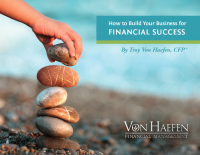
There was a big milestone here at Von Haefen Financial Management in past April. We celebrated our ten year anniversary. We didn’t celebrate with a big ceremony…..no cake and ice cream….no balloons or confetti, but please don’t let the lack of pomp and circumstance fool you. We are super excited, but, more importantly, we are blessed. We are blessed to have had the opportunity to serve you for the past ten years, so thank you!
Every year after tax season, I take a week off to reenergize after the rigors of tax work. This year I took some time to reflect on the past ten years and what I have learned. I focused purely on the planning aspect of my journey, and I would like to share with you the top ten things I have learned in the last ten years
1. It works
Sounds simple, right? But, fee-only financial planning approached with a holistic (comprehensive) perspective works amazingly well. As a fee-only advisor, I have a fiduciary relationship with my clients. This means my planning is always based on what’s in the best interest of the client. I have never received a commission, which has allowed me to deliver advice best suited for the client…..not my back pocket. My goal has always been to operate my practice at the highest ethical standard, and fee-only planning allows me to do so.
2. Everyone is different
Flexibility in the advice I dispense is critical to success. While obviously there are certain planning tenets that are paramount to achieve success, there are times when different methods and paths are necessary. There is no boilerplate planning at VFM. Every client is unique, and every client deserves a plan that works best for them. It’s not what works best for me or the financial planning community (or industry) at large: it’s what works best for the client and their unique set of circumstances.
3. Be ready for curveballs
Life has a way of derailing our plans. While some of you may have never experienced a major hardship or disaster, most all of you have been forced to take a detour from your plans due to some unexpected event (either good or bad). This illustrates the importance of fundamental financial support, as well as, the ability to plan with flexibility. I firmly believe that financial planning is a process…..not an event. Our financial plans need to be massaged and tweaked. We need to be ready to make adjustments as our lives change…..and they will change!
4. There’s no magic
Interestingly enough, I sometimes meet with prospective clients who seem to think I possess some form of financial magic. While there are tricks and tools of the trade that allow us to accelerate financial growth, I don’t’ don’t hold any silver bullets. I do hold experience, wisdom, and knowledge that allow us to create efficiencies that can accelerate growth. Financial success does require effort and work, but it doesn’t always have to be hard or painful…that’s where I can help.
5. There’s more to it than just numbers
One common misconception is that financial planning is all about investing. While investing is a piece, and an important piece, of the puzzle, there are many other factors at play. A successful financial life should be centered around balance. Money can certainly allow us to do things that bring us happiness, but understanding the emotional impact money has on our lives is very important. I was recently quoted in an article illustrating this point in Investment News. You can check out the story here.
There is a great deal of psychological baggage wrapped around our relationship with money, and the connection doesn’t always have anything to do with the amount of money we have or don’t have.
6. Control what you can control
I can’t control the stock market. I can’t control the job or housing market or the economic factors of our complex society. And, unfortunately, neither can you. But, there are things we can control that will help us to achieve financial success: how much we save; how much we spend; and how much we pay in taxes.
If we can control our spending, saving, and how much we pay in taxes, we can position ourselves for success. This takes proactive management, especially from the tax perspective, but managing these three factors will put you in control of decisions that will make a real difference in your financial future.
7. Tax planning is a must
How do you control how much you pay in taxes? We can’t skirt the tax laws, so how do we do it? To get to the answer you must understand how most people handle their tax liability. They simply drop off their tax data on their preparer’s desk and hope for the best. This reactive approach (sans-planning) is trouble in the making. Also, most tax discussions occur when it’s too late to impact the outcome (the spring after the end of the calendar year).
Taxes are the single largest expense most of us will have, so we should stop leaving it to chance and take control. We must stop being reactive and become proactive. Tax planning is a proactive approach that allows us to use projections to control our tax liability by maximizing tax deductions.
8. The market wins
As a fee-only advisor, I receive loads of trade magazines pedaling the latest sexy investment strategy. These strategies often sounds like a sure thing, but the real truth is most of these ideas are used to sell magazines….not increase your net worth.
The market wins. This has been shown by research illuminating the fact that it’s incredibly difficult to outperform the market, especially over time. Take the Vanguard Total Stock Market Fund. This fund essentially replicates the total stock market. Over the last ten years, it has outperformed 82% of the funds in its category. That’s a pretty good bet, and I would take those odds. If the market wins, then why take the risk with investment strategies that cost the investor higher fees? Remember the costs of investing is most often paid by returns, and a higher cost means a lower return. Over time small percentages can add up to painfully large dollars lost to fees. If it’s hard to impossible to outperform the market, then why try?
9. Measure your net worth
While standing around the water cooler and a work colleague ask what rate your investments returned last year, how do you respond? We have been trained to focus on our return on investment. Most people don’t know how to correctly arrive at an accurate number. It’s very complicated to correctly measure return of an entire portfolio….due to ongoing contributions. But, it’s not hard to measure your net worth growth, which is a holistic (comprehensive) measuring stick.
The most important number to measure is net worth growth. This not only measures growth of investments, but it also factors contributions to savings accounts, equity increases, and debt balances. You can’t hide success or failure by reviewing net worth growth.
For example, if your investments grew at a rate of 20% last year, but you took on $30k of consumer debt, your net worth would capture this event. So what if your investments grew but you eroded the growth by assuming new debt. Net worth holistically measures your financial well-being, which allows us to truly see the big picture.
10. I love my job
I am very thankful for the opportunity to have worked with all of my clients over the last ten years, and I look forward to many years to come. Fee-only financial planning is not just a career for me; it’s a passion. I am very passionate about helping people. I love the challenges involved in my line of work.
The tax code is constantly evolving (both good and bad). The economic environment ebbs and flows. Technology improves rapidly. But, the one constant is my commitment to my clients who are like family to me. I strive and will continue to strive to do the best I can to create efficiencies in their financial world and help them create a life of balance.
For this opportunity I am very thankful!
While there weren’t any news trucks parked outside my office covering our ten year milestone, the celebration is quietly loud….I’m shouting on the inside!

